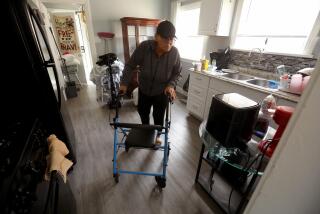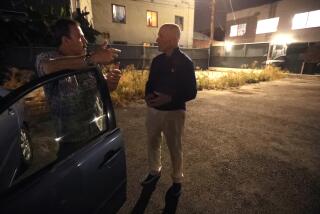An Angel of Mercy for the Homeless : Resources: At a time of shrinking funds, Lillian Rey still manages to find food, shelter and other aid for those forced to live on the street.
EL MONTE — Night and day, the phone rings insistently for Lillian Rey.
Her callers live under freeways and on the street. They are hungry, abused or about to be evicted. Sometimes, they have to panhandle two dimes just to make the call. But call they do, up to 50 each day, to the executive director of the El Monte/South El Monte Emergency Resources Assn.
After 12 years on the job, Rey, who works out of her El Monte home, has seen it all. The 65-year-old homeless woman who pushed her 20 cats around town in a grocery cart. The wife, fleeing an abusive husband, who lived on the street with her three children. The family of six being evicted from their apartment.
“We start from scratch with a phone call from someone out on the street,” explained Rey, 53. “Then we go out and assess their need.
“We put them in a motel so we know where they are. We try to find them an apartment, bring them food, furniture, clothes, find out if they’re eligible for some kind of Social Security. We get them back on their feet and back into society.”
The organization operates on a $102,000 annual budget, with contributions from United Way, the cities of El Monte and South El Monte, federal grants and local charities. Officials call it--and Rey--unique.
“She’s an angel of mercy, absolutely a lifesaver, and I’m so thankful we have her in our community,” said Jackie Raines, a human services supervisor for the city of South El Monte.
“Especially now with dwindling resources, when I get a call from a 16-year-old who has no food or place to stay, I’m able to call Lillian that day and get something done,” Raines added.
Rey is also an unofficial social worker. The homeless rely on her for everything from food and motel vouchers to help with refills on prescriptions and filling out welfare forms.
Need a couch? Rey might be able to get one donated. Hungry? She has a pantry behind her house stocked with donated oatmeal, canned soup, and emergency supplies such as children’s underwear and dishwashing detergent. No transportation? She can bring the help to you, in a huge white van that says “Donated to the El Monte/South El Monte Emergency Resources Assn. by Caring Friends.”
One recent muggy Friday, Rey, dressed in a white shorts outfit and tennis shoes, typed up the reports she must present each month to her board to account for every bit of food and aid that leaves her office. Then the phone rang. Two of her clients needed help and a third had disappeared.
“Let’s roll,” Rey said to a helper, shoving a box crammed with tuna, rice and other staples into the back of her van.
As she maneuvered the wide vehicle through El Monte, Rey scanned the sidewalks for Rosemary the Cat Lady. Rosemary, who is 65, became homeless when her roommate died of a heart attack in the trailer they shared, leaving Rosemary and her 20 cats without anyone to split the rent.
When Rosemary was evicted, she took to the streets, curling up at night in the doorway of an El Monte veterinary hospital that agreed to board and find homes for three of her Siamese cats. Rey found her there and promised to find animal shelters to house most of her cats and a trailer for Rosemary. But now the Cat Lady had disappeared.
“Hi Paul, have you seen Rosemary?” she asked a man with a bushy mustache and tattoos on his neck who waved hello from a trailer court. Paul hadn’t, but he had his own sob story to share with Rey. The van moved on.
There was no sign of Rosemary, so the van pulled into a motel, where Rey, who is bilingual, delivered a box of food to Norma Polanco and her three children.
Polanco, a shy Mexican woman, had called the tidy motel room home since June, when her husband left her. Polanco, who was evicted from her apartment, has no car to use in looking for work, no baby-sitter, no specialized skills. But thanks to Rey, she now has hope.
“I don’t know what I would do without this woman,” Polanco said shyly. “I don’t have money to feed my kids.”
Then it was on to Room 10 and Suzanne Lombardelli, 72. Rey found Lombardelli living under the San Bernardino Freeway (10) in El Monte and got temporary funds to board her in the motel.
Lombardelli is heartsick because her husband was arrested several days ago. Now she lives alone in the small, fetid room.
Jars of half-eaten food and crusted-over cold cream lie scattered about; the bathtub is clogged with greasy water, and bobs with dead roaches and dirty pots. From a hook hang four pairs of scissors and a tweezers.
Lombardelli is crying, saying that another motel patron tried to steal her food and burned her in the eye with a cigarette. She points to an ugly pink burn mark on her face. She begs Rey to call her doctor and get her the medicine she needs.
Rey holds her hand and promises. Embarrassment mingles with pride as Lombardelli pulls out her driver’s license to show Rey she was once a beauty who snagged a high-roller husband. Rey inspects the photo of a smiling woman with high cheekbones and fluffy, ash blonde hair.
“If I find you an apartment, will you move out of here?” Rey asks Lombardelli. The woman sniffles, says yes, and asks Rey for a few dollars. “I promise I’ll give it back to you when I get my check,” she vows. Rey reaches into her purse and fishes out a $5 bill.
Back in the van, making one last, vain sweep for Rosemary, Rey says she often gives her clients money out of her own pocket to tide them through, especially toward the end of the month when the homeless, who survive on a mixture of welfare aid and desperation, have run out of cash.
Rey never knows what she’ll find when she ventures out. One client infected her with body mites. She has gagged at the smell of some places she’s entered. One time, a group of men threatened to mug her 25-year-old son, who was helping her deliver food to people living in a run-down apartment.
But, “she’s resourceful; she holds her own and she’s able to identify those who are taking advantage and those who are sincerely in need of help,” said El Monte Assistant Police Chief Pete Mireles.
Back home, less than an hour after Rey went out, almost a dozen calls are waiting on her answering machine. Some are in Spanish, others in English. Many leave numbers at motels; others are calling from pay phones and mumble they will try again later.
Today, the calls on the machine are beseeching, pleading, unending. The names and faces change, but the problems remain steady, worse than any other time in her 11 years on the job.
Rey says she’s had other job offers but wouldn’t consider leaving. She still puts in 10- and 12-hour days, despite a husband who would prefer her to work regular hours.
But there is always something to be done: paperwork to be completed, deliveries to be arranged, calls to be returned. She is looking for a permanent assistant. The work is grueling and emotionally difficult; six previous assistants quit after short stints.
Rey paused to reflect: “You don’t know how many times I just cry.”
More to Read
Sign up for Essential California
The most important California stories and recommendations in your inbox every morning.
You may occasionally receive promotional content from the Los Angeles Times.










